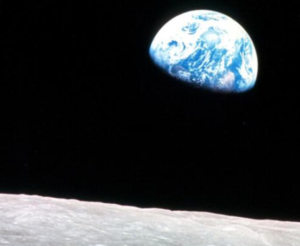Worldwide Moon Day gives lift to tranquil participation in space

NASA Apollo 8, the main monitored mission to the moon, entered lunar circle on Christmas Eve on December 24th, 1968.
20 July 2023 Climate and Climate
The UN praised the second ever yearly Worldwide Moon Day on Thursday, advancing continuous global collaboration in the serene utilization of space while likewise regarding memorable accomplishments in space investigation.
For centuries, civic establishments have admired the sky contemplating the beginning and secrets of the Moon.
Ground-based perceptions empowered by the creation of the principal telescopes opened another part in figuring out Earth’s divine sidekick, and for humankind itself.
‘One little step’
Following the introduction of room investigation almost quite a while back, the Moon immediately turned into the final location for endless logical missions, including a few manned flights that finished in that commended first Moon arriving, in 1969.
The UN General Gathering proclaimed 20 July Global Moon Day to respect both the commemoration of the Apollo 11 landing and raise public mindfulness in regards to the obligation to manageable lunar investigation with respect to public and worldwide space programs around the world.
Trying the impossible
Perceiving the normal interest of humankind in space, the Overall Gathering embraced its most memorable goal connected with space in December 1958, entitled Question of the Serene Utilization of Space, announcing space ought to be saved for stringently tranquil purposes.
In October 1967, the UN Settlement on Standards Overseeing the Exercises of States in the Investigation and Utilization of Space, including the Moon and Other Heavenly Bodies, likewise went into force.
Among different expectations, the settlement – seen by quite a few people as the “Magna Carta of space” – disallows States from putting weapons of mass obliteration on any satellite or heavenly body, or from upholding cases of public power in space.
Today, the UN Office for Space Issues (UNOOSA) is answerable for advancing global collaboration in the tranquil usage of space.
UNOOSA fills in as the Secretariat for the General Gathering’s just board of trustees managing global collaboration in the tranquil purposes of room: through the Advisory group on the Quiet Purposes of Space (COPUOS).
Another period of commitment
Numerous public space organizations and corporate substances have started to perceive the monetary capability of lunar investigation, especially with respect to the foundation of radiocommunications advancements on the moon.
In 2021, the UN’s Global Media transmission Association (ITU) laid out the Space Recurrence Coordination Gathering (SFCG) to organize a worldwide exertion zeroing in on space research, space tasks, and radioastronomy notwithstanding Earth investigation, meteorological, radionavigation, and between satellite advancements.
“Quiet relations and efficient global collaboration over space radiocommunication allotments are fundamental, whether for worldwide or business missions,” said the ITU.
Worldwide endeavors
The US space office, NASA, has likewise driven a different worldwide alliance called the Artemis program that draws on the UN’s 1967 space deal to lay out a “maintainable and hearty” presence on the moon, the ITU features.
“Quiet relations and systematic worldwide collaboration over space radiocommunication portions are fundamental, whether for global or business missions,” said Cathy Hoax, who heads the ITU master bunch for space radiocommunication applications, examining NASA’s Artemis program.
“NASA and its kindred space organizations conceive proceeded with examination to work on living souls and fulfill the human journey for information on our universe. The investigation missions that help such examination wouldn’t be imaginable without ITU’s work,” she said.
UNOOSA has recognized various manners by which these global space investigation projects can assist with meeting the UN Maintainable Improvement Objectives.
